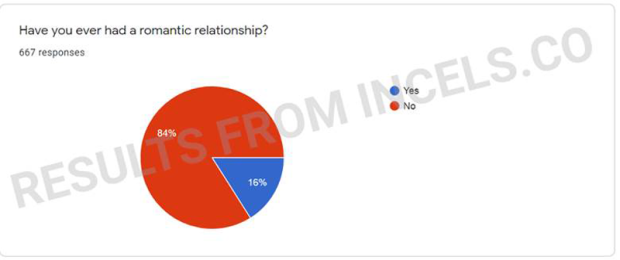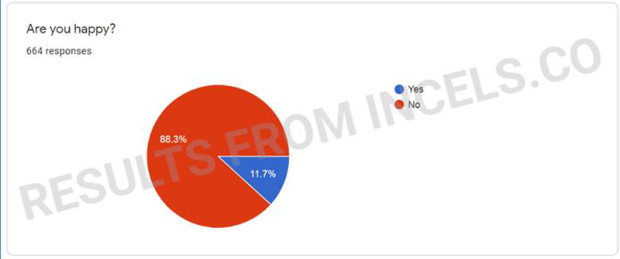September 10, 2020
If someone touched your mouth with her mouth voluntary you are not an incel.
If you had unpaid sex you are not an incel
If you had a relationship you are not an incel.
This forum is full or trolls or fakecells.
(post on incels.co responding to poll results)
Incels, or involuntary celibates, are probably the most infamous segment of the “manosphere” – the online morass of misogyny that includes incels, Pick Up Artists (PUAs), MGTOWs (Men Going Their Own Way) and Men’s Rights Activists (MRAs). They also appear to be the most prone to public displays of brutality: Law enforcement attributes 50 murders in North America in the last six years to violent incels.
But despite the notoriety of the term, we don’t know that much about the incel population, which researchers speculate could include as many as 100,000 people, most of them men. Who are incels? What do they believe? What drives their actions?
In March 2020, moderators at incel.co, one of the largest incel online forums, released the results of a community poll. Reactions on the site ranged from gratitude to outrage.
The poll, which closely followed a late 2019 survey that yielded almost identical results, included questions about romantic history, sex and dating, and asked users to evaluate their own appearance and emotional wellbeing. Self-reported and unscientific, these results nonetheless provide a much-needed window into a little understood ideology – whose adherents may pose a demonstrated risk for violent behavior.
Findings and reactions
The polls in 2019 and 2020 attracted 550 and 665 respondents, respectively, most of whom replied to all 40+ questions, which delved into respondents’ body types, race and ethnicity, interest in plastic surgery and frequency and seriousness of suicidal thoughts.
Some posters on incels.co said they were glad to see that others were struggling with the same issues they faced, while others questioned the results, calling out the “fakecels” (men whose romantic histories preclude them from incel status), larps (live action role players, or posers) and trolls whose responses, they charged, had skewed the results.
It’s impossible to say how accurately the poll responses reflect the incel community. But while the results are far from scientific, they do expose rifts in the community, and highlight the suspicion some self-professed incels seem to have towards one another. Taken at face value, these results also offer a rare window into the world of incels – their mindset, their values and their collective psychological state.
The portrait that emerges is by turns entirely predictable and occasionally surprising. Taken as a composite, the “average” incel is in his mid-20s, of average height, white and European or North American. He has never had a sexual relationship or kissed a woman. He is deeply unhappy, possibly depressed, and has considered having (but has never had) surgery for purely aesthetic purposes. He believes his physical appearance is the most important element in his lack of romantic success, followed by his lack of social skills.
NOTE: (All Graphics from incels.co).
Demographics
Incels are generally perceived/believed to be young, white men. The March 2020 poll results largely confirm that profile: 82 percent of respondents said they were between the ages of 18 and 30. The largest percentage (36 percent) were between the ages of 18 and 21. The second largest segment (27.9 percent) said they were between 22 and 25, followed by 18.1 percent aged 26-30. Perhaps most alarmingly, nearly 8 percent said they were younger than 17.
The incel community is commonly presumed to be largely white, or white –presenting – an assumption based in part on several self-described incels who have become violent in recent years, including Scott Beierle and Alek Minassian. These results don’t upend that theory, but they do add nuance.
While roughly 55 percent of respondents identify as white or Caucasian, the remaining 45 percent of are equally divided among a range of ethnic and racial groups, including Black, Latino, Asian, Indian, Middle Eastern or Other/Not Sure.
In addition to representing an array of ethnicities, incels are not contained to any one country or continent. Inceldom is a fully international experience. Nearly 43 percent of poll respondents hail from Europe and 38 percent live in North America, while small segments of respondents are from Central and South America, Asia, Oceania and Africa. It is notable that every continent, aside from Antarctica, is represented by the respondent incels.
Fully 100 percent of poll respondents identify as male, but that’s because, an administrator who posted the findings noted, “two answers from females have been excluded to keep the results relevant to the male-only demographic of the forum.”
The preponderance of male respondents (and the administrator’s unwillingness to include female answers) is unsurprising, as incel ideology and rhetoric is steeped in misogyny. There are women who identify as incels (and in fact the term was coined by a woman), but they’re not welcome on incel message boards. Some male incels will refer to women as “femcels,” but use the term as an insult, rather than a show of solidarity. This is borne out by the responses to a question about whether women can be incels, with just 12.6 percent responding in the affirmative.
Sexual and Romantic Experience
Since the term “incel” is a portmanteau of “involuntary celibate,” it seems safe to assume that many of these men have had little to no sexual or romantic experience. The poll results largely confirm these expectations -- with a few exceptions.
While 84 percent of respondents reported never having had a romantic relationship, just 16 percent of respondents said they had.
Inceldom is not just about sex; it’s about finding a romantic partner, but that doesn’t seem to be panning out for most respondents, either: Nearly 63 percent indicated that they had never kissed anyone. The 37 percent of those who had, however, got the most notice from posters at incels.co, with some suggesting that the act of kissing a “foid” (a derogatory incel term for a woman) disqualifies you from being a “real” incel.
Perhaps most critically (as far as incels are concerned), 85.4 percent of respondents asserted that they have never had sex, while 14.6 percent reported that they had. Since virginity is the defining factor of being an “incel,” these results are unsurprising. They, do, however, underscore the movement’s foundational ideology and parameters for self-identification. Virginity is central to “inceldom;” some violent incels have noted their virgin status in their manifestos or other online posts as motivating factors for their violence. As with the kissing question, the small percentage of respondents who reported having had sex prompted angry responses from the majority group, and accusations of being “fakecels.”
Nearly 20 percent of respondents said they had “been with an escort.” While we can assume that at least some of these escorts were hired explicitly for sex, we can’t say how many, or whether sex actually took place.
Mental Health
Mental health questions (and responses) provide a critical window into the incel experience.
Most incels reported feeling profound dissatisfaction and unhappiness with their lives; 77.2 percent of respondents said they are not optimistic about their future. Similarly, 88.3 percent of respondents reported that they are unhappy. Both responses indicate that deep-seated dissatisfaction is an elemental aspect of the incel worldview.
Many incels who spend time on online forums report feeling insecure and have a fundamentally pessimistic worldview. Taken to an extreme, this is known as being “blackpilled” -- a nihilistic attitude reflecting the inherent hopelessness of an incel’s sitaution: no matter how hard an incel tries to “improve” himself – by looksmaxxing (undergoing plastic surgery) or other extreme tactics -- he will always remain celibate and inferior to other men.
With this bleak outlook in mind, 95.4 percent of respondents said that they find the “blackpill” ideology to be an accurate reflection of their reality. Since just 4.6 percent of respondents disagreed with this, it is clear that the pessimism and self-loathing associated with the “blackpill” is central to incel culture.
Many incels also report suffering from psychiatric disorders, like depression and anxiety. In fact, 67.5 percent of respondents said they experience “long-lasting” depression.
Even when full-blown depression is not an issue, an outsized percentage of respondents -- 74.1 percent – say they experience anxiety, stress or emotional distress “in a constant manner.” This means that just 26 percent of respondents consider themselves free from a significant psychological impairment or struggle.
Perhaps unsurprisingly, contemplation and discussion of suicide features prominently on incel forums, and functions in tandem with the pervasive “blackpill” concept. Since many incels believe they are doomed to a life of unhappiness and celibacy, they consider suicide a legitimate and viable alternative: in the late 2019 poll, a full 67.5 percent of respondents said they have considered suicide in a serious manner. The 2020 poll did not include the question.
Physical Appearance
Incels unequivocally believe that they are celibate and/or unable to find a romantic partner because of their physical unattractiveness. Since outward appearance is such a broad category, the poll broke it into separate elements. The responses indicate how various physical traits are valued differently in the incel world.
Similarly, many incels believe that being overweight or below the average male height are indicators of physical unattractiveness. In fact, the incel community coined the term “heightcel” to refer to someone who is involuntarily celibate specifically due to their short stature.
Based on the poll responses, however, height does not appear to be a significant issue: When asked to report how tall they are, 41.1 percent of respondents said they are between 5’9” and 6 feet, and 18 percent said they are between 6’1’’ and 6’4”. These responses did draw some skeptical commentary from posters at incels.co.
Incels place a huge premium on physical attractiveness and believe that if they just looked a certain way, they’d have great success with women. This leads many of them to consider plastic surgery. More than 60 percent of respondents said they had “considered surgery for purely aesthetic improvement.” However, just 6.6 percent of respondents reported actually having undergone cosmetic surgery. This suggests that for most incels, plastic surgery remains a purely hypothetical solution.
Additional findings
At the end of the poll, respondents were asked to select all the factors that they believed were preventing them from finding them a partner. The number one answer (86.5 percent) was general physical appearance, followed by “physique,” at 58 percent, while 48.5 percent indicated “height,” 31.4 percent picked “style,” and 21.6 percent selected “hair loss/balding.”
The top five choices all fall under the larger umbrella of physical appearance, reinforcing just how crucial attractiveness is to incels, and how inexorably they link their putative ugliness to their inability to find a partner. Alongside the impressions gleaned from the full survey data, these findings paint a grim picture of a subculture mired in an obsession with appearance and tortured by hopelessness and suicidal tendencies.













